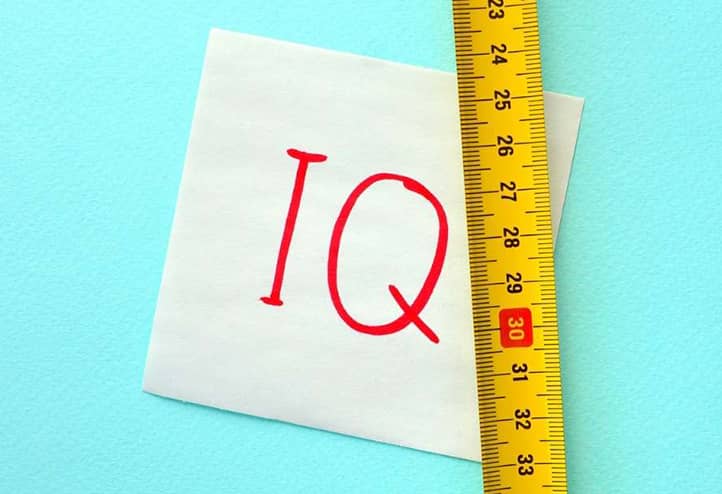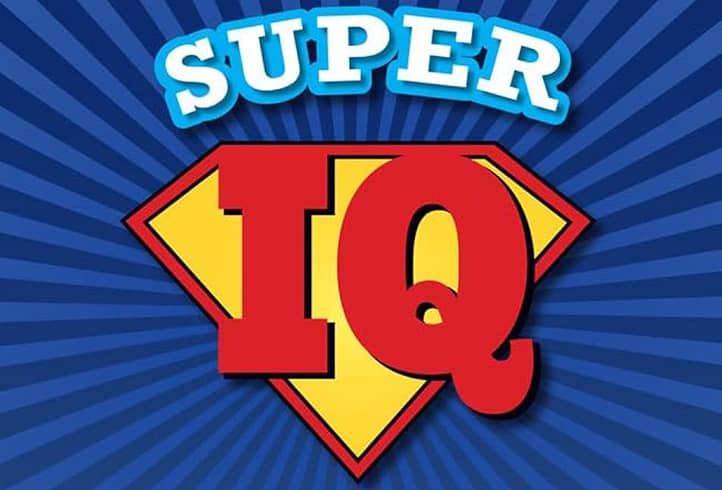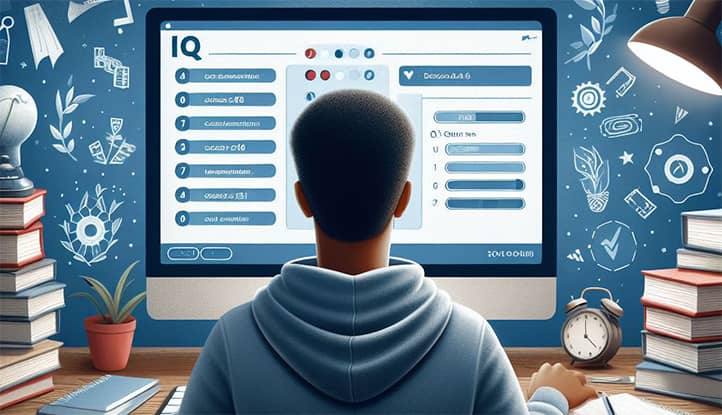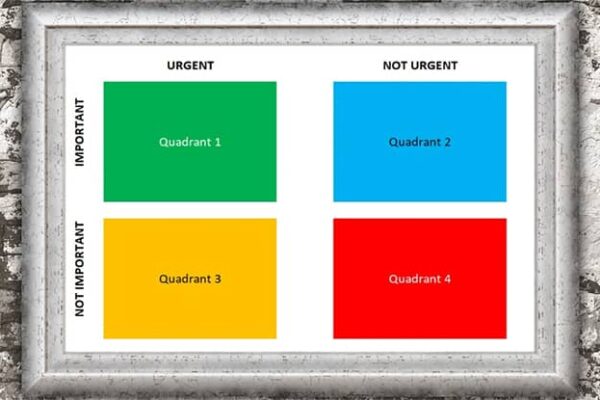In the age of digital technology and the information society, online IQ tests have become an integral part of modern psychometrics. These tools, accessible to a broad audience, allow people to assess their cognitive abilities from the comfort of home. However, beneath their apparent simplicity and accessibility lies a range of complex psychological, ethical, and methodological issues.

Defining IQ and Its Significance
IQ, or Intelligence Quotient, is a numerical measure designed to assess an individual’s intellectual abilities relative to the average population level. This concept, which emerged in the early 20th century, has undergone significant development and transformation, remaining one of psychology’s most debated and controversial constructs.
IQ’s significance extends beyond a mere number. In modern society, it is often seen as a predictor of academic success, professional achievement, and even life success. Studies show correlations between high IQ and success in education, career advancement, and even life expectancy. However, it is essential to understand that IQ is only one of many factors influencing a person’s life success.
The concept of IQ is not without its critics. Many researchers point to its limitations, particularly its inability to account for various forms of intelligence, such as social or emotional intelligence. Additionally, there are questions surrounding the cultural bias of IQ tests and their applicability across different sociocultural contexts.
The Rise of Online IQ Tests
With the advancement of the internet and digital technologies, traditional paper-based IQ tests have gradually given way to online versions. This shift is driven by several factors, each of which warrants closer consideration.
Accessibility is a key advantage of online tests. Unlike traditional testing methods that require the presence of a qualified psychologist and specialized equipment, online tests can be taken at any time and place with internet access. This opens opportunities for people living in remote areas or with limited mobility.
The speed of receiving results is another significant advantage. Most online tests provide results immediately after completion, while traditional testing may take days or even weeks for processing and interpretation.
Variety also contributes to the popularity of online tests. Users can choose between different formats, from short, entertaining quizzes to more serious, longer tests claiming scientific validity.
Affordability is also a notable factor. Many online tests are free or significantly cheaper than traditional testing by a psychologist, making them accessible to a wide audience, including students, the unemployed, and those on a budget.
However, the growth of online IQ tests raises a number of serious questions. How reliable and valid are these tests? How do they affect the mental state of those taking them? What ethical issues arise from their widespread use? These and other questions require careful consideration and analysis.

The History of IQ Testing
To better understand modern online IQ tests, it’s important to examine their historical development. The history of IQ testing reflects not only the evolution of psychology as a science but also changes in society as a whole.
The Origins and Development of IQ Tests
The history of intelligence testing began in the early 20th century when psychologists began developing methods to quantify mental abilities. This process can be divided into several key stages:
- 1905: French psychologists Alfred Binet and Théodore Simon developed the first intelligence test for children, aiming to identify those needing special education. The Binet-Simon test included tasks that assessed reasoning, understanding, and problem-solving abilities, marking the first step toward standardized intelligence assessment.
- 1916: American psychologist Lewis Terman adapted the Binet-Simon test for use in the United States, creating the Stanford-Binet test. Terman introduced the term “Intelligence Quotient” (IQ), which quickly became popular. The Stanford-Binet test gained widespread use in educational and clinical settings and in the U.S. military during World War I.
- 1939: David Wechsler developed the Wechsler Adult Intelligence Scale (WAIS), a test that evaluated both verbal and non-verbal intelligence. WAIS and its later versions became some of the most widely used IQ tests worldwide.
- 1960s: Culturally independent tests, like Raven’s Progressive Matrices, emerged. Designed to minimize cultural bias in test results, these tests used non-verbal tasks based on visual patterns, enabling the assessment of intelligence across different cultural and educational backgrounds.
Throughout the second half of the 20th century, intelligence testing methods continued to improve. Psychologists developed increasingly sophisticated tests to address various aspects of cognitive abilities. At the same time, criticism of IQ led to alternative theories of intelligence, such as Howard Gardner’s theory of multiple intelligences.
The Shift from Paper-Based to Online IQ Tests
The late 20th century saw the beginning of the digital era for IQ testing with the development of computer technology, and this transition unfolded in several stages:
- 1980s: Early computer versions of traditional IQ tests allowed for automated scoring and interpretation. The use of computers also enabled more accurate measurement of reaction time and task completion speed.
- 1990s: The spread of personal computers made computer-based IQ tests available for home use. Tests were distributed on CD-ROMs and floppy disks, allowing people to take them at their convenience.
- 2000s: The development of the internet introduced the first online IQ tests accessible through web browsers, reaching a massive audience and making IQ testing a truly widespread phenomenon.
- 2010s and Beyond: The rise of mobile technology brought IQ tests to smartphones and tablets, making them available virtually anywhere and anytime. Developers created dedicated mobile apps optimized for small screens and touchscreen navigation.
This shift to online formats has significantly transformed the landscape of IQ testing. On one hand, it has made tests more accessible and convenient for users. On the other, new challenges related to the reliability and validity of online tests have arisen, as well as issues around data privacy and the ethical implications of mass testing.
Modern online IQ tests often employ adaptive algorithms that adjust the difficulty of tasks in real time to the level of the individual being tested. This approach allows for more accurate results and reduces testing time. Additionally, many online platforms offer not only IQ measurement but also assessments of other cognitive functions, such as memory, attention, and information processing speed.
However, despite technological advances, online IQ tests face several challenges. The lack of control over testing conditions, the possibility of using external resources, and issues with result validation all cast doubt on the accuracy and reliability of online testing.
Moreover, the proliferation of online IQ tests has led to numerous low-quality or even fraudulent resources offering “quick and easy” IQ measurement without any scientific basis. This creates a risk of misinformation and may lead users to draw inaccurate conclusions about their abilities.
Overall, the shift from paper-based to online IQ testing reflects a broader trend toward digitalization and democratization of access to information and self-assessment tools. Yet, this process also raises important questions about the balance between accessibility and scientific rigor, data protection, and the ethical aspects of mass intelligence testing.

Psychological Aspects of Online IQ Testing
Online IQ testing brings with it a range of unique psychological aspects that can significantly impact the testing process and results. Understanding these aspects is crucial for both test developers and users.
The Impact of the Digital Environment on Results
The digital environment in which online testing takes place can affect results in various ways, and this impact is not always immediately evident.
Firstly, the comfort factor is worth noting. Many people feel more relaxed when taking a test in the familiar setting of their own home. This can help reduce test anxiety, which in turn may lead to higher scores. Studies show that stress levels during testing can significantly affect cognitive functions, especially working memory and processing speed. Thus, a comfortable home environment may provide a more accurate assessment of intellectual abilities.
However, the home setting may also contain more distractions than the controlled environment of a laboratory or psychologist’s office. Notifications on a smartphone, background noise, or the presence of other people can all negatively impact concentration, and, consequently, test results. Cognitive psychology research indicates that even brief interruptions can substantially decrease performance on cognitive tasks.
Another important factor is the technology barrier. For some individuals, particularly older adults or those with limited computer experience, interacting with a digital interface can be stressful and distracting. This can lead to lower test scores, as some cognitive resources are directed toward navigating the interface rather than solving the tasks.
Additionally, internet speed and equipment quality can influence results. A slow internet connection or computer lag can increase the time needed to complete tasks, affecting the overall test score. Given that many IQ tests include timed tasks, technical problems can significantly distort results.
Finally, the digital environment itself influences information processing. Reading from a screen differs from reading from paper, which can affect the speed and accuracy of completing verbal tasks. Studies show that people often read faster on a screen but less attentively, leading to potential errors in understanding complex instructions or textual tasks.
Stress and Anxiety Factors in Online Testing
Online testing can evoke various psychological responses that influence results.
Test anxiety is a phenomenon well-known in educational psychology, characterized by heightened worry and physiological arousal in test-taking situations. In online IQ testing, test anxiety can manifest similarly to traditional testing. However, there are specific factors that may intensify or mitigate anxiety in the online format.
On one hand, the lack of direct contact with a test administrator can reduce social anxiety for some individuals. On the other hand, the absence of support and the inability to ask questions may increase anxiety in others. Research shows that high test anxiety significantly lowers IQ test scores, particularly on tasks requiring working memory and attention.
Time pressure is another significant stress factor. IQ tests are typically time-limited, which can increase the feeling of pressure and stress. This is especially relevant for individuals prone to procrastination or those who struggle with time management. The sense of limited time can lead to rushed decisions and mistakes that could have been avoided in a calmer environment.
Uncertainty about the testing process also creates stress. In traditional testing, a psychologist can clarify ambiguous points or answer questions. In an online format, this option is often unavailable, potentially causing anxiety about understanding instructions or completing tasks correctly.
The fear of technical issues adds a unique stress factor to online testing. Concerns about possible internet connection issues, computer freezing, or accidental browser closure can significantly raise anxiety during the test. This distracts from the tasks and negatively impacts cognitive performance.
Reliability of Results
The reliability of online IQ test results raises several serious questions that need to be considered when interpreting outcomes.
The lack of control over testing conditions is one of the primary challenges in online testing. Unlike the traditional format, where a psychologist can ensure standardized conditions, online tests take place in an uncontrolled environment. This can lead to significant variability in test conditions among participants, calling into question the comparability of results.
The potential for cheating is another serious issue. With online testing, there is a risk of using external resources or getting help from others. This is especially relevant for tests that do not use video monitoring or other control methods. Studies show that even minor assistance or the use of a calculator can significantly boost test scores, leading to an inaccurate assessment of actual abilities.
Calibration of online test results is also a concern. Not all online tests undergo thorough calibration and standardization with a representative sample. This can lead to distorted results and incompatibility with traditional IQ test outcomes. Additionally, the lack of normalization for a specific population may result in the misinterpretation of results across different cultural contexts.
Interpreting results without professional guidance is also problematic. Many online tests provide automated reports that may be difficult for a non-specialist to understand. Without professional interpretation, there is a risk of misinterpreting and misusing the data. This can lead to inaccurate self-assessment, poor career decisions, or even psychological issues.
Finally, the issue of “self-selection” in online testing exists. People who voluntarily take online IQ tests may not represent a representative sample of the population. This may skew results and make it challenging to generalize them to larger groups.
These factors highlight the need for a critical approach to the results of online IQ tests. Although they can provide useful insights into cognitive abilities, their outcomes should be interpreted cautiously and, if possible, supplemented with other methods of assessing intelligence and abilities.

Advantages of Online IQ Tests
Despite several issues related to online testing of intellectual abilities, this format has significant advantages that contribute to its growing popularity.
Accessibility and Convenience
One of the main advantages of online IQ tests is their high accessibility. Unlike traditional testing methods, which require in-person attendance and are often associated with long wait times and high costs, online tests are available almost instantly and from anywhere with an internet connection.
This geographic independence is especially important for people living in remote areas or with limited mobility. The online format allows them to access tools for assessing intelligence that might otherwise be unavailable.
Flexible timing is another significant benefit. Users can take tests at a convenient time without being tied to the schedules of psychologists or testing centers. This is particularly important for people with busy work or study schedules, as well as those who prefer to take tests at specific times of the day when they feel most productive.
A low entry threshold also contributes to the popularity of online IQ tests, many of which are free or have low costs compared to traditional professional testing. This makes them accessible to a wide audience, including students, people with limited budgets, and those curious about their cognitive abilities.
Speed of Receiving Results
Quick processing of test results is possible thanks to the use of computer algorithms. These algorithms can analyze user responses in real-time, compare them to normative data, and generate a report almost instantly, saving time and reducing anxiety associated with waiting for results.
Automated analysis also allows for more detailed information on results. Many online tests go beyond a simple IQ score and provide a detailed analysis of various cognitive abilities. This may include an assessment of verbal and non-verbal skills, spatial thinking, memory, and other components of intelligence.
Possibility of Retesting
The possibility of retesting is a unique advantage of online IQ tests, opening up interesting opportunities for both users and researchers.
Tracking progress is a major advantage of retesting. Regular testing allows users to monitor changes in their IQ scores over time. This is especially beneficial for individuals actively working on developing cognitive abilities, such as through special training or educational programs.
Practice and skill improvement is another benefit of retesting. Although IQ is often considered a relatively stable characteristic, regular practice with typical IQ test tasks helps improve skills in certain areas. This may not necessarily lead to a higher overall intelligence level but can enhance performance in specific cognitive skills.
A significant psychological aspect of retesting is the reduction of test anxiety. The more experience a person has with taking tests, the less stress they feel. This can lead to more accurate results, as anxiety’s impact on cognitive functions diminishes.
An important psychological aspect of repeated testing is the reduction of test anxiety. The more experience a person has with taking tests, the less stress they cause. This can lead to more accurate results, since the influence of anxiety on cognitive functions is reduced during testing.
Checking the stability of results is another advantage of the possibility of repeated testing. Repeated tests can confirm or refute the results of previous attempts. If the results are stable over several attempts, this increases confidence in their reliability. On the other hand, significant fluctuations in results may indicate the need for a more in-depth assessment or the influence of external factors on test results.
In addition, the possibility of repeated testing opens up interesting prospects for research in the field of cognitive psychology. It allows us to study the factors influencing the change in IQ scores over time, the effects of practice and learning, and the long-term stability of cognitive abilities.
However, it is worth noting that frequent repeated testing can lead to a “practice effect”, when the improvement in results occurs not due to a real increase in intelligence, but due to familiarity with the format of the tasks. Therefore, it is important to take this factor into account when interpreting the results of repeated tests.

Disadvantages and Limitations of Online Tests
Despite their many advantages, online IQ tests have a number of significant disadvantages and limitations that should be considered when using and interpreting the results.
Lack of Control Over Testing Conditions
One of the main drawbacks of online tests is the lack of control over the conditions in which the test is taken. Unlike the standardized environment of a laboratory or psychologist’s office, the home setting can vary significantly from user to user.
An uncontrolled environment may include various distracting factors, such as noise, the presence of other people, or notifications on a smartphone or computer. All these factors impact attention and, therefore, the test results.
The possibility of using external resources also presents a serious problem. Without direct supervision, it is impossible to guarantee that the test-taker is not using additional sources of information, such as a calculator, internet searches, or help from other people. This can lead to inflated results and an inaccurate assessment of true abilities.
Technical issues, such as computer malfunctions or internet connectivity problems, can significantly affect test results. This is especially critical for timed tasks, where even a slight delay can lead to a substantial change in the outcome.
The lack of observation of the test-taker’s behavior is another major drawback. Professional psychologists can gain valuable additional information by observing non-verbal reactions, stress levels, and problem-solving strategies. This information can be useful in interpreting results and understanding the individual characteristics of the test-taker.
Issues of Standardization and Validity
Standardization and validity are key aspects of psychological testing, and they pose particular challenges in the context of online IQ tests.
The variety of tests is both an advantage and a disadvantage of the online format. There are numerous online IQ tests available, but not all of them have undergone rigorous scientific validation. Many tests are created without considering psychometric standards, which calls into question the reliability of their results.
The lack of uniform standards for administration and result interpretation is also a serious problem. Unlike professional IQ tests, which have strict protocols for administration and interpretation, online versions often lack such standards. This complicates the comparison of results across different tests and their interpretation in a broader context.
A limited sample for norming poses another issue. Many online tests are normed on limited or non-representative samples. This can lead to skewed results, especially when trying to interpret them in the context of the general population.
Cultural bias is another serious problem with many online tests. Some tests may contain tasks that are culturally specific and do not account for the diversity of users from different countries and cultural backgrounds. This can lead to systematic underestimation of results for certain groups of users.
Risk of Misinterpretation of Results
The absence of professional interpretation is one of the main risks of online IQ testing. Without the help of a qualified psychologist, there is a risk of misunderstanding and misusing test results.
Overestimating the significance of the results is a common issue. People may place too much importance on the results of an online test without considering its limitations and potential inaccuracies. This often leads to unfounded conclusions about their abilities and potential.
The impact on self-esteem is another important aspect. Misinterpretation of results can negatively affect a person’s self-esteem and motivation, especially in cases where the results are lower than expected.
Neglecting other factors is also a serious issue. IQ is only one aspect of intelligence, and online tests often do not consider other important factors, such as emotional intelligence, creativity, or practical skills. Focusing solely on IQ can lead to an incomplete or distorted understanding of one’s abilities and potential.
Moreover, there is a risk of using online test results to make important life decisions without considering their limited validity. For example, a person may choose not to pursue a certain career path or educational opportunities based solely on online IQ test results.
It is also worth noting that many online tests provide automated reports that are too generalized or do not consider the individual context of the test-taker. This can lead to incorrect conclusions or recommendations.
In general, while online IQ tests are considered useful tools for self-discovery and development, their results should be interpreted with great caution. The ideal approach would be to use online tests in combination with a professional consultation from a psychologist or cognitive development specialist to obtain a more comprehensive and accurate picture of intellectual abilities.

Recommendations for Taking Online IQ Tests
To maximize the benefits and minimize the risks associated with taking online IQ tests, it’s essential to follow several key recommendations.
Choosing Reliable Testing Sources
Selecting a reliable testing source is a critically important step. It is recommended to:
- Research reputation: Choose tests from reputable psychological organizations or educational institutions. Look for information on the test developers and their qualifications.
- Verify the scientific basis: Look for details on how the test was developed and validated. Reliable tests usually include descriptions of their methodology, data on validity, and reliability.
- Read reviews: Review feedback from other users and experts on the specific test. Pay attention to comments regarding accuracy of results and quality of interpretation.
- Avoid “entertainment” tests: Tests that promise quick and sensational results are usually unreliable. Look for tests that emphasize their scientific basis and limitations.
- Check for updates: Ensure that the test is regularly updated and reflects modern research in psychometrics and cognitive psychology.
Preparing for the Test
Proper preparation can significantly impact the accuracy of test results:
- Get enough rest: Take the test when you feel alert and focused. Avoid testing when tired or stressed.
- Ensure a suitable environment: Choose a quiet, comfortable place to take the test. Ensure you can sit in a comfortable position.
- Eliminate distractions: Turn off notifications on your phone and computer. Ask those around you not to disturb you during testing.
- Ensure stable internet connection: Check the speed and stability of your internet connection before starting to avoid technical issues.
- Review instructions: Carefully read all instructions before beginning the test. Seek clarifications if anything is unclear.
- Prepare necessary materials: If the test allows using paper and a pen for notes, have them ready in advance.
- Mentally prepare: Remember, the test is an opportunity to learn about your strengths and areas for improvement—not a final judgment of your abilities.
Interpreting Results with Caution
Proper interpretation of an online IQ test result requires a critical approach:
- Don’t overestimate significance: Remember, an online test is just one of many ways to assess intellectual abilities. Test results do not define your worth as a person or your potential for success in life.
- Account for error margin: All tests have a measurement error. Do not view the result as an exact number. Typically, an IQ score represents a range rather than specific points.
- Consider context: Factor in reasons that may have influenced your result (stress, fatigue, distractions). If you feel you didn’t perform your best, consider retaking the test.
- Analyze subtests: If the test provides results by components (e.g., verbal abilities, spatial thinking), note your strengths and areas needing improvement.
- Compare with other indicators: Compare the test results with your academic achievements, professional successes, and everyday problem-solving experiences.
- Use results constructively: Instead of focusing on the IQ score itself, use the results to identify areas where you can enhance your cognitive skills.
- Seek professional assistance: If you want a more accurate IQ assessment and a deeper understanding of your results in the context of your life, consider professional testing with a psychologist.
- Be mindful of limitations: IQ is only one aspect of intelligence. It does not measure creativity, emotional intelligence, practical skills, or many other crucial aspects of cognitive ability.
By following these recommendations, you can gain maximum benefit from online IQ tests while minimizing the risks of misinterpreting results. Remember, the purpose of such tests is not merely to obtain a score, but to better understand your cognitive abilities and identify ways to develop them further.

Alternative Methods for Assessing Intelligence
Although IQ tests are widely used, they are not the only way to evaluate intellectual abilities. There are alternative approaches that can provide a more comprehensive picture of a person’s cognitive skills.
Multifactorial Theories of Intelligence
Multifactorial theories of intelligence offer a broader view of cognitive abilities:
1. Howard Gardner’s Theory of Multiple Intelligences, which suggests that there are several types of intelligence rather than just one. These types include:
- Linguistic intelligence (language skills)
- Logical-mathematical intelligence
- Spatial intelligence
- Musical intelligence
- Bodily-kinesthetic intelligence
- Interpersonal intelligence (understanding others)
- Intrapersonal intelligence (self-understanding)
- Naturalistic intelligence (understanding nature)
Online tests based on this theory provide a more rounded assessment of abilities, helping to reveal a person’s strengths in various areas.
2. Robert Sternberg’s Triarchic Theory of Intelligence posits three aspects of intelligence:
- Analytical intelligence: the ability to analyze, evaluate, compare, and contrast information
- Creative intelligence: the ability to generate new ideas and solve novel problems
- Practical intelligence: the ability to apply knowledge in real-life situations
Tests based on this theory assess not only traditional academic skills but also creativity and practical application of knowledge.
3. CHC Model (Cattell-Horn-Carroll). This theory combines ideas from several researchers and proposes a hierarchical model of intelligence, which includes over 70 narrow abilities organized into 16 broad abilities that are combined under a general factor of intelligence.
Practical Tests and Real-Skills Assessment
Alternatives to traditional IQ tests include methods based on real-life situations and practical skills:
- Situational tests involve simulations of real-life or work scenarios. They evaluate a person’s ability to apply their knowledge and skills in specific contexts.
- Portfolio of achievements involves collecting and analyzing a person’s specific work outcomes (projects, publications, inventions). It allows the evaluation of real accomplishments rather than just potential.
- 360-degree feedback gathers evaluations of a person’s abilities from various sources (colleagues, supervisors, subordinates), providing a multifaceted assessment of practical skills and capabilities.
- Problem-solving tests present participants with tasks from real life or professional activities, assessing their ability to apply knowledge in practice.
- Emotional intelligence tests evaluate a person’s ability to understand and manage their emotions and the emotions of others, often a key factor for real-life success.

Ethical Issues in the Use of Online IQ Tests
Using online IQ tests raises ethical concerns that require careful consideration.
Data Confidentiality
- Protection of personal information. Online tests often collect users’ personal data, and it’s crucial to ensure strong protection against unauthorized access.
- Third-party data usage. There is a risk that test results may be sold or shared with third parties, such as advertisers or employers, without users’ consent.
- Long-term data storage. It’s necessary to address how long test results should be stored and in what form, as well as who may have access to them.
Risk of Discrimination Based on Test Results
- Unfair use in education. There is a danger that online IQ test results may be used for unwarranted segregation of students or to limit their educational opportunities.
- Discrimination in employment. Employers may inappropriately use online IQ test results to make hiring or promotion decisions, overlooking other important factors.
- Social stigmatization. Widespread sharing of IQ test results could lead to social stigma for individuals with lower scores, disregarding their other abilities and potential.

Conclusion
In closing this psychological analysis of online IQ tests, it is important to emphasize their dual nature in today’s digital landscape. On the one hand, these tests offer unprecedented accessibility and convenience for those looking to evaluate their cognitive abilities. They open doors to self-discovery and personal growth, allowing individuals to gain insights into their intellectual strengths and weaknesses from the comfort of home. However, this accessibility comes with significant limitations and potential risks.
A critical approach to choosing and interpreting online IQ tests is not merely a recommendation but a necessity. Users should be aware that the results of such tests are not a final verdict on their intellectual potential but rather a starting point for further exploration and development. In this context, alternative methods of intelligence assessment, such as multifactorial theories and practical tests, become particularly significant, providing a broader and more detailed picture of human abilities.
The ethical issues related to online IQ testing, specifically data confidentiality and potential discrimination, require close attention and a proactive approach from developers, users, and society as a whole. As technology continues to evolve, we can expect more sophisticated, accurate, and reliable online tools for assessing intelligence.
Ultimately, the future of online IQ testing lies in balancing technological innovation, scientific rigor, and ethical considerations. Only such a balanced approach will allow us to fully realize the potential of these tools for personal growth and societal development, while avoiding the potential negative consequences of their misuse or misinterpretation.




